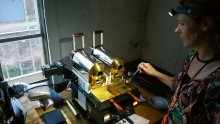Coffee Quality Manager Beth Ann Caspersen recently traveled to the Democratic Republic of the Congo to judge the country's first-ever coffee cupping competition. This is the fifth blog post in the series about the visit. Read part one here.
Day 2

Over the next few days, I had a series of conversations in my head about how we had to do it, despite the challenges that seemed to mount by the hour. For instance that morning we learned that the hotel didn’t take credit cards - another hiccup.
But we arrived to the lab and there we found a tank of propane gas to hook the roaster up to (hooray!) so Dan Bailey from Amavita got busy connecting the flexible hose to the gas tanks, clamped it down, tested it for leaks and we were almost ready to roast. Much like many sample roasters, the Joper coffee roaster operates on electric and gas; it needs both to operate. Now all we needed was the generator or a consistent line of electricity.
‘The Generator is coming’
It is so frustrating when someone tells you that something is “on the way” or “it’s almost here” and then you wait for hours. So I started working on the grinder, the guys started working on the roaster, and we looked for a creative solution to our energy crisis. Ultimately we paid the local beer brewery $10 to allow us to use their electricity all day. Finally we were tapped into the local electrical grid, the gas line was installed, and we turned the roaster on! Success, the roaster worked! Now all I had to do was season the roaster and figure out how to roast on it. I have worked on a lot of roasters over the years, so I was confident that I could make headway. Once we were up and running, Caleb and Dan left; they were headed up to watch the amazing finish of Run Across Congo (7 marathons run in 7 day by 9 strong women). I bid farewell to my roaster buddies and crossed my fingers that I could make sense of this new coffee roaster.
Shortly after noon, we were in business and were able to execute the first sample roast batch. Being a newbee to the Joper coffee roaster from Portugal, I thought it would make sense to read through the manual provided with the machine, but it presented conflicting information for how I have been roasting and teaching roasting for the last 17 years ... a four minute roast? Charge at 465? So, I put the manual aside and went back to the basics by applying all of the fundamental aspects of roasting, like sight, sound, smell, taking good notes, and using a timer. By 7:30 that evening I had achieved my first good roast. It wasn’t perfect, but we had come a long way that day.
Two days left to go.
